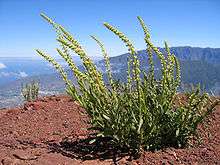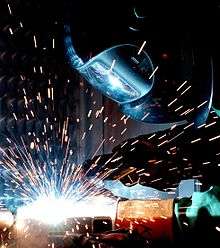Definify.com
Webster 1913 Edition
Weld
Weld
(wĕld)
, Verb.
T.
To wield.
[Obs.]
Chaucer.
Weld
(wĕld)
, Noun.
[OE.
welde
; akin to Scot. wald
, Prov. G. waude
, G. wau
, Dan. & Sw. vau
, D. wouw
.] 1.
(Bot.)
An herb (
Reseda luteola
) related to mignonette, growing in Europe, and to some extent in America; dyer’s broom; dyer's rocket; dyer's weed; wild woad. It is used by dyers to give a yellow color. [Written also
woald
, wold
, and would
.] 2.
Coloring matter or dye extracted from this plant.
Weld
,Verb.
T.
[
imp. & p. p.
Welded
; p. pr. & vb. n.
Welding
.] [Probably originally the same word as
well
to spring up, to gush; perhaps from the Scand.; cf. Sw. välla
to weld, uppvälla
to boil up, to spring up, Dan. vælde
to gush, G. wellen
to weld. See Well
to spring.] 1.
To press or beat into intimate and permanent union, as two pieces of iron when heated almost to fusion.
☞ Very few of the metals, besides iron and platinum. are capable of being welded. Horn and tortoise shell possess this useful property.
2.
Fig.: To unite closely or intimately.
Two women faster
welded
in one love. Tennyson.
Weld
,Noun.
The state of being welded; the joint made by welding.
Butt weld
. See under
– Butt
. Scarf weld
, a joint made by overlapping, and welding together, the scarfed ends of two pieces.
Webster 1828 Edition
Weld
WELD
, WOLD,Noun.
Definition 2026
Weld
Weld
English
Proper noun
Weld
- A surname possibly deriving from the Old English word for woodland. The family is mainly located in the Southern regions of England.
Anagrams
weld
weld
English

Reseda luteola

A person welding
Alternative forms
Noun
weld (plural welds)
- A herb (Reseda luteola) related to mignonette, growing in Europe, and to some extent in America, used to make a yellow dye.
- The yellow coloring matter or dye extracted from this plant.
Synonyms
- (Reseda luteola): dyer's rocket; dyer's weed; wild woad
Translations
herb
Etymology 2
Alteration of well (“boil, rise”), probably influenced by the past participle, welled
Verb
weld (third-person singular simple present welds, present participle welding, simple past and past participle welded)
- (transitive) To bind together inseparably; to unite closely or intimately.
- 1847: Alfred Lord Tennyson, The Princess
- Now should men see / Two women faster welded in one love / Than pairs of wedlock.
- 1847: Alfred Lord Tennyson, The Princess
- (transitive) To join two materials (especially two metals) together by applying heat, pressure and filler, either separately or in any combination.
Translations
to bind, unite
|
to join materials (especially metals) by applying heat
|
|
Noun
weld (plural welds)
- The state of being welded.
- (Can we add an example for this sense?)
- The joint made by welding.
Derived terms
- butt weld
- scarf weld
See also
Etymology 3
Verb
weld (third-person singular simple present welds, present participle welding, simple past and past participle welded)
- (transitive, obsolete) To wield.
- 1485: Sir Thomas Malory, Le Morte D'Arthur, p. 168 line 2 (Sommer edition)
- [Arthur says to a wicked giant] "he that alle the world weldeth gyue the ſorte lyf & ſameful dethe" ("He who wields all the world gives thee short life and shameful death")
- 1485: Sir Thomas Malory, Le Morte D'Arthur, p. 172 line 2 (Sommer edition)
- [Arthur says to conquering knights] "ye be wothy to welde all your honour and worship"
- 1485: Sir Thomas Malory, Le Morte D'Arthur, p. 168 line 2 (Sommer edition)
References
- weld in Webster’s Revised Unabridged Dictionary, G. & C. Merriam, 1913
Anagrams
Central Franconian
Alternative forms
- well (chiefly Moselle Franconian)
Etymology
From Old High German wildi.
Pronunciation
- IPA(key): /ʋelt/
Adjective
weld (masculine welde or welle, feminine weld or well, comparative welder or weller, superlative et weldste)
Usage notes
- The traditional inflected forms are those with -ll- in all dialects. Those with -ld- are now predominant, however, in many dialects under standard German influence.